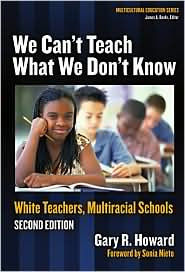Gary Howard’s book begins with his own story: he managed to all but finish high school in Seattle in 1964 without having come across someone of a different race. Then he went to Yale and began participating in an outreach program at the YMCA, which led to a lifelong dedication to helping others understand the complexities of culture, and most of all race.
 The title is borrowed from the words of Malcolm X, ‘We can't teach what we don't know, and we can't lead where we can't go.’ Howard posits that we need to understand all races and how the European white race became dominant. He makes the case that we need to understand our own cultural identity, which is a surprisingly uncomfortable one, and acknowledge our responsibility for the oppression of others.
The title is borrowed from the words of Malcolm X, ‘We can't teach what we don't know, and we can't lead where we can't go.’ Howard posits that we need to understand all races and how the European white race became dominant. He makes the case that we need to understand our own cultural identity, which is a surprisingly uncomfortable one, and acknowledge our responsibility for the oppression of others. This may sound overly morose, but the book actually supports finding meaningful ways to communicate effectively and sincerely with people from other cultural groups. The implications for libraries are obvious. Howard, who has dedicated his life to this, also runs the REACH Center in Seattle, a nonprofit, internationally renowned institution, which provides workshops, training and consultation.
.
Howard, G.R. (2006). We can’t teach what we don’t know: White teachers and multiracial schools. New York: Teachers College Press/Columbia University.



No comments:
Post a Comment